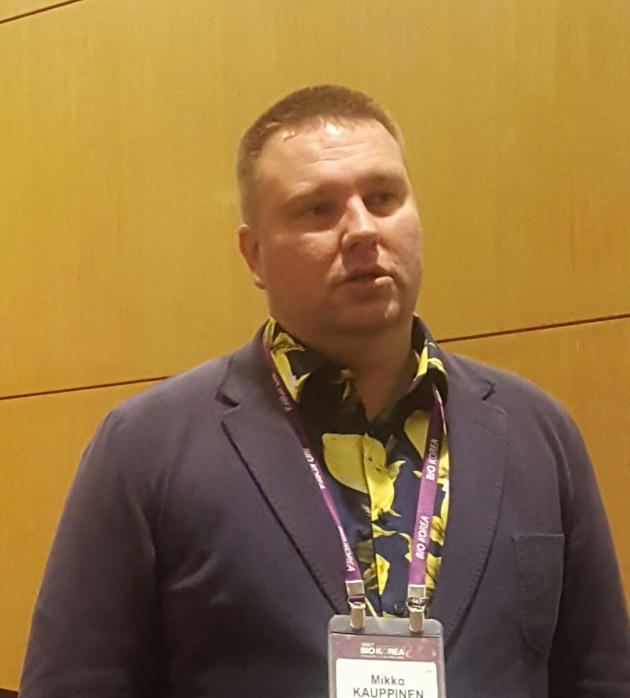In this era of the digital world and fourth industrial revolution, what is as important as – if not more than – specific technologies is how to connect them into one organic system. The healthcare sector is no exception.
That explains why Mikko Kauppinen established the “Health Innovation and Energy Village in Finland several years ago -- to group digital health startups together to a GE Healthcare building to jointly develop applications in the GE platform and give directions to each company’s needs and wants.

Kauppinen said he believes not only technology and policy in digital health but also the collaboration between hospitals, corporations, healthcare start-ups and platform providers can create a “digital health ecosystem.”
“The objective of creating a connected ecosystem in digital healthcare is for companies to associate together,” he said in an interview with Korea Biomedical Review, held on the sidelines of Bio Korea 2017 conference, which kicked off for a three-day run at Coex Wednesday.
Less than five years ago, healthcare companies operated on their own and were not collaborating with each other. However, there is a shift toward platform products nowadays, Kauppinen added.
Analyzing the new paradigm in the healthcare system, Kauppinen said that a hierarchy of platforms in hospitals would be placed where the smaller companies develop applications to be uploaded in those platforms.
“A lot of leading consumer electronic companies see an opportunity that platforms will develop in healthcare. Successful platforms will be those that will be able to attract the best application developers for new platforms,” he said.
From this built ecosystem, medical devices will also shift, he noted, citing the example of replacing equipment at medical institutions. Up till now, hospitals would take seven to 10 years to change their machines based on their budget but in the future, the same machine can evolve itself by upgrades and updates, providing customers with healthcare applications, he said.
“It’s not easy to develop an ecosystem; you have to understand how to make an ecosystem that surrounds your company,” Kauppinen said. “This is very critical because a lot of recognizable companies like Nokia, Microsoft, and Blackberry all failed to make a successful ecosystem.”
Asked about Korea’s current healthcare ecosystem, he pointed to the vast gap between big hospitals and local clinics status, stating there must be a balance for a stable ecosystem.
“Hospitals are not any different from any business. Small startup companies similar to local clinics can be powerful in the medical industry because they adapt quickly and are more focused in a particular area,” Kauppinen said. “Rather than doing everything a hospital can do, they can specialize and focus on a particular area.”
Kauppinen noted that small clinics could adapt themselves to where the customers are. They can settle in shopping malls, supermarkets, and subway stations compared to reputable hospitals.
“What’s also important is that the major hospitals are often very slow in acquiring new technology. They have the money, but it doesn’t mean they are adopting it quickly,” the Finnish innovator said. “A small clinic can decide to try innovations for example ‘telemedicine’ where patients can video-call their doctors. Focus and speed in adopting new technology and new consumer behaviors are vital.”
Kauppinen praised the Korean government for supporting digital healthcare and believed that creating the right foundations and the right environment can create a good business. “By giving opportunities such as funding programs and being open-minded about providing new solutions, Korea is heading on the right track,” he said.
Bio Korea 2017 kicked off on Wednesday with its lecture about new ideas within digital health that are generating new devices, services, and platforms to improve the patient’s and consumer’s lives. Global companies such as Apple, Google and IBM are entering the health care field with this knowledge, creating a new type of healthcare ecosystem.

